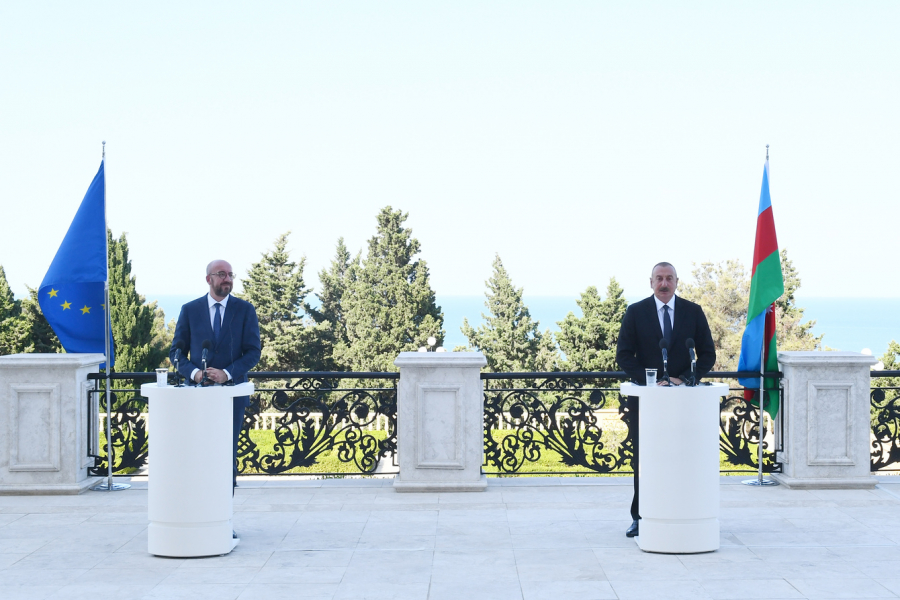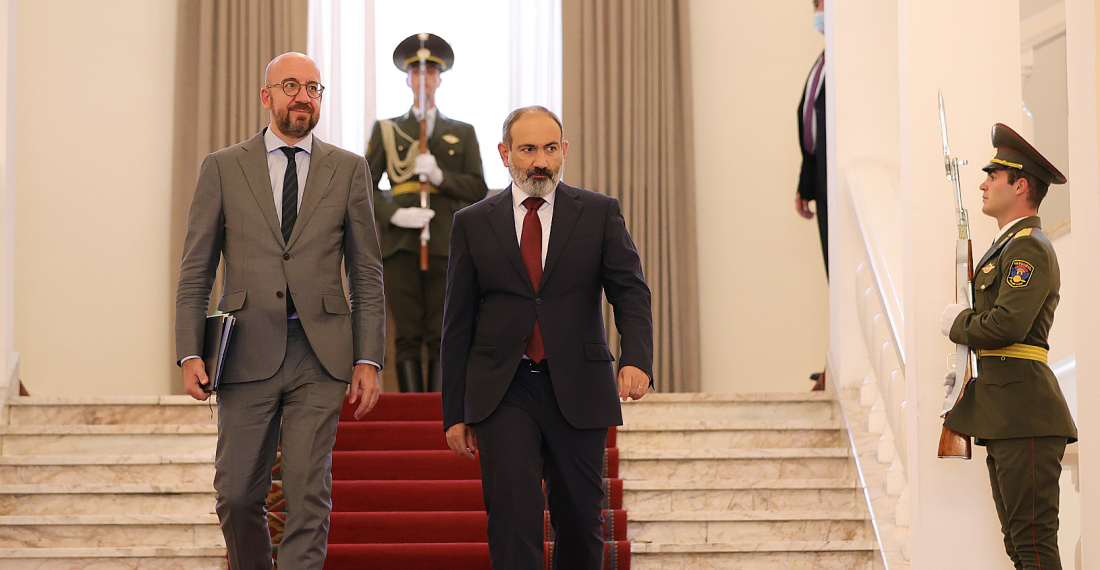Charles Michel, the president of the European Council, was in the capitals of Armenia and Azerbaijan this weekend for meetings with the countries’ leaders. Michel brought with him the message that the EU is committed to the South Caucasus region, whilst on a mission to speak to the leaders about how the EU’s Eastern Partnership Summit in December can be made a success.
On Saturday (17 July) in Yerevan, beyond discussing bilateral relations, the leaders discussed EU priorities in Armenian-Azerbaijani relations, including the importance of the sides avoiding verbal escalation and inflammatory rhetoric, the role of dialogue in the delineation of borders, regional co-operation projects such as the opening of transport communications, and the issue of the status of Nagorno-Karabakh.
At a joint press conference following their meeting, the Armenian prime minister, Nikol Pashinyan, highlighted that contacts between the European Union and Armenia had never been so extensive. He asserted that the last year’s conflict had led to new realities in the region, but that the Nagorno-Karabakh issue could only be solved diplomatically, putting his support behind the OSCE Minsk Group Co-Chairs' 13 April statement, requesting that the parties resume high-level dialogue under their auspices at the earliest opportunity. The acting prime minister highlighted the ongoing detention of Armenians in Azerbaijan, and accused Baku of “obstructing” the process of opening regional transport links – a stipulation of the 10 November 2020 ceasefire agreement – both with “blatant threats to occupy the sovereign territory of Armenia” and by “[refusing] to provide Armenia with a corridor for the launch of the Armenia-Georgia and Azerbaijan-Russia railways”. Conversely, he stressed Armenia's commitment to restoring existing transport routes and establishing new ones. Pashinyan expressed gratitude for the seven (originally five) projects in Armenia that the EU intends to spend €2.6bn on.
In response, President Michel congratulated Pashinyan on his party’s win in the 20 June parliamentary elections, conveying the message that the EU “[stands] by Armenia”, and confirming the EU’s €2.6 billion support package. Michel expressed the EU’s commitment to the South Caucasus and its desire to strengthen its ties with the countries of the region. Expressing support for the work of the OSCE Minsk Group in the resolving of the Nagorno-Karabakh Issue, Michel outlined the four short-, medium- and long-term topics that the EU sees as priorities
- “The importance of moderation, the importance of avoiding aggressive rhetoric and verbal escalation”;
- “the delimitation of borders” – for dialogue and negotiation to be initiated to resolve disputes on the Armenian-Azerbaijani border, suggesting that the withdrawal of troops could be useful for this end;
- The importance of discussing “co-operation projects” including but not limited to the opening of transport communications; and
- The establishment of a status for Nagorno-Karabakh and peace negotiations, also taking into account things such as cultural heritage.

Michel then travelled to Baku on Sunday (18 July) to meet with President Ilham Aliyev, where both reiterated the importance of regional co-operation for peace in the region, whilst also discussing trade and bilateral ties.
At a joint press conference, Aliyev referred to the EU as a close partner of Azerbaijan, highlighting their broad co-operation together and their substantial trading relationship – constituting 40% of Azerbaijani trade. He noted that issues related to connectivity are “always on the agenda between the EU and Azerbaijan” and raised the opportunities that the 10 November agreement provides for the opening of regional transport corridors. Aliyev said he was confident, having discussed “our plans, our initiatives and our approaches to the newly emerged situation”, that “we can resolve most of the issues that remain on the table and lay down the foundation for broad regional co-operation”. Aliyev said that the EU plays and would continue to play a very important role in the South Caucasus, and that Michel’s visit to the three countries demonstrates the EU's involvement and the EU’s agenda, which is very much in line with that of Azerbaijan.
Michel first spoke of an “extensive and in-depth exchange of views” on EU-Azerbaijan bilateral relations, expressing a desire to give new impetus to their relations. He then raised their discussions over the EU Eastern Partnership Summit in December, confirming that his visits to the partnership countries was a sign of the EU’s commitment to the security, stability and prosperity of the region and to mobilising the EU’s capabilities and resources as a result of dialogue with partners and knowledge of their different expectations. He then went on to discuss the situation between Armenia and Azerbaijan, thanking Aliyev for communicating his views and for his commitment to first steps in the solving of the important issues of Armenians detained by Azerbaijan and the handing over of Armenian maps of minefields to Azerbaijan. He expressed the EU’s willingness to support efforts on various subjects, including by providing expert assistance in the delimitation of the countries’ border, and to participate in and encourage regional co-operation efforts.
The visit by Michel comes a few weeks after a blog post by the EU High Representative for Foreign Affairs and Security Policy, Josep Borrell, calling for more EU engagement with the South Caucasus region.
Michel will today (19 July) conclude his tour of the South Caucasus with a visit to the Georgian city of Batumi, where he will meet with the leaders of the ‘Associated Trio’ – Georgia, Ukraine and Moldova.



